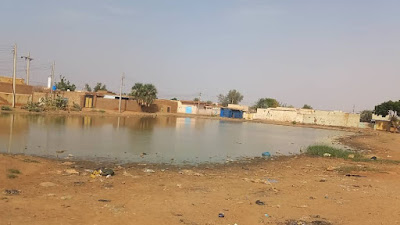NOTE from Sudan Watch Editor: Shortly after fighting erupted in Sudan 15 April 2023, the Sudanese authorities dismissed the UN from Sudan and refused visas for most journalists. News of the humanitarian crises mainly comes from aid agencies in Sudan such as UNHCR, UNICEF, MSF, NRC.
They know when to expect rainy seasons in Sudan. Now, suddenly, after weeks of torrential rain, 10 hours daily in some areas, floods have destroyed flimsy shelters and subjected civilians of all ages to malaria, cholera and waterborne diseases while being cut off from food, water, medicines and medical help, Sudan's Health Minister Haitham Ibrahim pops up in the media today (Aug 18) to appeal for "immediate" and "urgent" international aid, knowing that many roads are impassable or too dangerous to use.
What has he been working on in the past year? Is he still getting paid? If so, what for? He knows villagers in RSF controlled areas can't survive without protection, food, water purification, medical help, medicines for cholera, malaria, waterborne diseases etc. Allegedly, many villagers are drinking from the Nile River. Here is a simple guide to drinking water from the Nile:
- Can you drink from the Nile? The River Nile is the primary source of freshwater for drinking, irrigation, and industrial purposes in Egypt. However, it is not recommended to drink water directly from the Nile due to pollution and contamination.
- Is the Nile river water drinkable? No, the water from the Nile River is not safe for drinking. It is heavily polluted with sewage, poisonous chemicals, fertiliser residues, radioactive waste, and oil pollution.
Also, here are excerpts from a below mentioned report published today titled 'Sudan health minister declares cholera epidemic':
- Sudan's health minister Haitham Ibrahim yesterday declared a cholera epidemic after weeks of heavy rain in the country, in a video released by his ministry.
- "We are declaring a cholera epidemic because of the weather conditions and because drinking water has been contaminated," Haitham Ibrahim said in the video.
- He said the decision was taken in conjunction with authorities in the eastern state of Kassala, United Nations agencies and experts after the "discovery by the public health laboratory of the cholera virus".
- Famine has been declared in a displacement camp in the vast western region of Darfur.
- For weeks the country has seen torrential rainfall, with Kassala state badly hit. The authorities there have appealed for "immediate" and "urgent" international aid. Read more.
From Medicalxpress online
Written by AFP (Agence France-Presse)
Dated Sunday, 18 August 2024
Sudan health minister declares cholera epidemic
Full story: https://medicalxpress.com/news/2024-08-sudan-health-minister-declares-cholera.html
_______________________________
Related reports
From UN International Organization for Migration (IOM)
Displacement Tracking Matrix (DTM)
Dated Saturday, 17 August 2024. Full copy:
Natural Disaster Displacement Summary: Floods (Update 002):
The Natural Disaster Displacement Summary compiles DTM updates on incidents of flood-induced displacement across Sudan.
Between 01 June and 12 August 2024, DTM Sudan reported 60 incidents of heavy rains and floods that triggered sudden displacement in Sudan. Rains and floods have displaced an estimated 117,835 individuals (23,567 households) from locations across 12 different states in Sudan.
This report outlines incidents of flood-induced displacement between 6 and 12 August 2024. For information on earlier reported incidents, see Natural Disaster Displacement Summary (Update 001).
- DTM observed 31 incidents of flood-induced displacement between 6 and 12 August 2024.
- These reported incidents triggered the displacement of an estimated 96,465 individuals (19,293 households).
- Approximately 32,611 structures were either partially damaged or destroyed by the rain and floods.
Note: All figures should be understood as preliminary estimates, pending further verification. DTM Sudan will continue to provide updates on flood-induced displacement via Early Warning Flash alerts, distributed via the DTM-IOM Sudan mailing list. For further information on displacement and mobility in Sudan, see Sudan Mobility Update (05).
View original: https://dtm.iom.int/reports/natural-disaster-displacement-summary-floods-update-002
____________
DTM Sudan Flash Alert
Dated Sunday, 18 August 2024 - Update Two
Rains and Flooding in Al Fasher Locality, North Darfur
Between 12 and 17 August 2024, heavy rain and floods across Al Fasher locality, North Darfur reportedly displaced 867 households. The floods primarily affected Abu Shock IDP Camp of Al Fasher town and Zamzam IDP Camp of Zamzam town, Al Fasher locality. Field teams estimated that 867 houses were destroyed, and 1,389 houses and 1,028 latrines were partially damaged. Displaced households sought shelter with host communities within the same locality.
Note: The situation on the ground remains highly fluid. All figures should be understood as preliminary estimates only, pending further verification. DTM will continue to monitor the developments closely as network coverage permits and will provide regular updates on displacement and population mobility across Sudan. The latest DTM Sudan report is available here. DTM Sudan's Early Warning Flash Alerts provide immediate updates on incidents and sudden displacement in Sudan.
View original:
End




.jpeg)

.jpeg)




